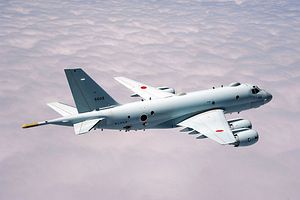The Japanese Ministry of Defense announced on Monday that it would cancel upcoming consultations with South Korea to review the facts of an ongoing dispute between the two countries over an alleged fire control radar lock-on against a Japanese Maritime Self-Defense Force (MSDF) aircraft conducted by the South Korean Navy in December 2018.
The decision accompanied a seven-page release by the Ministry of Defense outlining what Tokyo believes to be the facts surrounding the encounter. The release was accompanied by support reference materials, including an 18-second audio file allegedly demonstrating the absorption of radar waves by the Kawasaki P-1 aircraft belonging to the MSDF that was allegedly targeted.
The incident occurred on December 20, according to the Japanese side. South Korea has denied that any vessel had conducted a radar lock-on instead claiming that its warship was using a search radar to aid a North Korean vessel in distress. The Japanese side is calling Monday’s statement its “final” statement on the matter.
“The MOD once again strongly protests against the [Republic of Korea] destroyer’s fire-control radar irradiation, and strongly urges the ROK to accept that this incident occurred and conduct thorough measures to prevent its recurrence,” it noted in its statement.
“We express deep regrets over [Tokyo’s] decision to stop consultations designed to verify the facts,” Choi Hyun-soo, a spokesperson for the South Korean Ministry of Defense noted after the Japanese announcement.
“The sounds that the Japanese side presented are just mechanical sounds from which we can never verify the pieces of information we have demanded — the detection date, angle and traits of electromagnetic waves,” she added.
The Japanese statement concluded that it valued further cooperation with South Korea. “Our stance remains unchanged in that the Japan-ROK and Japan-ROK-U.S defense cooperation is extremely important,” it noted.
“We hope that this announcement will lead to the prevention of similar incidents in the future, and we will continue to make sincere efforts towards continuous Japan-ROK and Japan-ROK-U.S defense cooperation.”
South Korea has continued to express its interest in discussing the alleged incident and its Defense Ministry spokesperson again called for Tokyo to apologize on Monday. A fire control radar lock-on by a surface warship against an aircraft is commonly interpreted as a sign of hostile intent and a precursor to an attempted intercept.
The bilateral dispute between Tokyo and Seoul over the radar incident comes at a time of generally high tensions after South Korea’s Supreme Court, in November, ordered Japan’s Mitsubishi Heavy industries to pay South Korean citizens wartime reparations for forced labor in its factories.

































